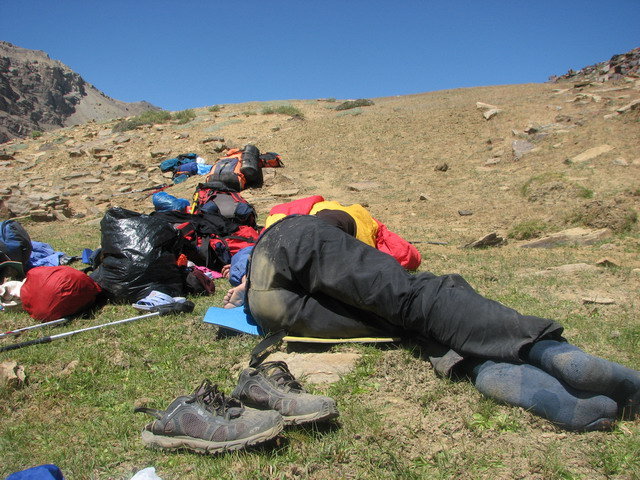КАК ВЫЖАТЫЙ ЛИМОН:
EXHAUSTED, TAPPED OUT, BUSHED
(LITERALLY, "LIKE A SQUEEZED LEMON)

Ever been too pooped to pop? Ever been so pooped that the thought of popping -- or standing up, or talking or even taking off your clothes before collapsing in bed -- makes your head spin? If you need to express fatigue -- from mild to bone-numbing -- in Russian, you're in luck: There are plenty of verbs and expressions to choose from.
The standard verb for being tired is уставать/ устать, but you can add intensifiers to taste. Мы работали с утра до ночи! Я так/безумно/жутко/ ужасно устал! (We worked from morning till night! I'm so/incredibly/terribly/awfully tired!) The adjective усталый can be applied to any body part that shows fatigue: " У тебя усталый вид. (You look tired; literally, "have a tired appearance.") Similarly, "У тебя усталые глаза. (Your eyes look tired.) On the fatigue-o-meter, утомляться is a bit stronger: It means to become exhausted, worn out. You can also use the nice verb переутомляться -- to become overtired, which happens to children who stay up to late and adults who are crashing to meet a deadline. Я страшно переутомилась -- уже не соображаю, что делаю. Представляешь, вчера заперла ключи в машине! (I'm burned out -- I don't even know what I'm doing. If you can believe it, yesterday I locked my keys in the car!) An adjective from this verb, утомительный, is used to describe the source of the fatigue, be it a person -- утомительный ребёнок (a tiring/tiresome child) -- or thing -- утомительная работа (hard work).
Even higher on the scale is изнемогать/ изнемочь (to be spent, drained). This is rather high-flown and old-fashioned and can be most often found in lines of poetry -- мой дух изнемогает (my spirit is weary) -- but if you are the sort who reaches for smelling salts and clutches your breast, you might try: От жары я изнемогаю. (I'm fainting from the heat.) Another form of the word is more common: Он работает до изнеможения. (He's working to the point of exhaustion.) Finally, you can use the verb изнуряться/изнуриться, though this generally has the sense of being physically wasted due to illness or hunger: Она изнурена голодом/лихорадкой. (She is wasted from hunger/fever.)

More colloquially you can say, Я вымотался. (I've run myself ragged.) You can also say Работа выматывает меня. (Work is wearing me to a frazzle.) Even more colloquially and vividly you can describe yourself as a "squeezed lemon." This is good for those times when you are all tapped out: После поездки я чувствовала себя, как выжатый лимон. (After the trip I came home totally bushed.) Or you can say, Я приехала домой и просто свалилась с ног. (I came home and just crashed/collapsed; literally, "fell off my feet.")
Russian has a number of expressions that describe physical fatigue in terms of legs that no longer hold you up. "Устала? Я еле стою на ногах! (Tired? I can barely stand!) Он еле держался на ногах. (He was about to drop in his tracks; literally, "He was barely supported by his legs.") My favorite expression is без задних ног -- literally "without one's hind legs." Он притащился домой без задних ног. (He dragged himself home on his last legs.) This expression is often used with verbs for sleeping to describe "the sleep of the dead" -- that is, when you are so exhausted, you don't fall asleep, you pass out. После обеда он задрых без задних ног. (After dinner he went out like a light.)
For describing mental exhaustion, you can try ум за разум заходит/зашёл. Impossible to translate literally ("my sense has gone behind my reason"), this describes the state when you work too long and get confused, or when your brain no longer functions.
Or you might pine, Я так долго переводила, что аж в глазах потемнело. (I've been translating for so long that I've gone blank; literally, "it's gone dark.")
|



